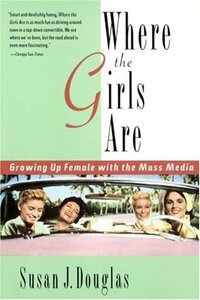Take a photo of a barcode or cover
Makes me wish I taken her classes while I was at Hampshire. I particularly enjoyed the way the explains the visceral importance of music to young women -- something I can absolutely relate to. She also points out how feminism is the civil rights movement most connected to anti-consumerism and how deeply cynical it is that corporations found a way to coopt the movement (you're worth it! enjoli, etc.) the book was published in the 90s -- I would love to read a follow up if there is one.
An interesting analyzation of girls shaped by the media and feminism, starting in the late '50s and early '60s and ending on the brink of the '90s. It's interesting to read overall, but a lot of the analysis seems, to me, blown out of proportion. Were the Beatles really popular because they were androgynous, and girls wanted to be like them? Were certain TV show characters meant to show women how to be subservient? Perhaps, but maybe the Beatles just write catchy songs, and TV shows are mindless entertainment. Easy to swallow if taken with a grain of salt.
That being said, the historical parts were much more interesting than the pop culture analysis. For someone who wasn't alive during that time, it was fascinating to read about the rallies, struggles, and news coverage that came along with feminism. Douglas has written other books on the topic, picking up from the 1990s where she left off, and I will definitely be reading those to see what she has to say about my generation.
That being said, the historical parts were much more interesting than the pop culture analysis. For someone who wasn't alive during that time, it was fascinating to read about the rallies, struggles, and news coverage that came along with feminism. Douglas has written other books on the topic, picking up from the 1990s where she left off, and I will definitely be reading those to see what she has to say about my generation.
Good for a feminist media studies class (or even an intro media studies, broadly). But it does sometimes become nothing more than a rattling off of media than an analysis thereof, and sometimes it seems to spin in circles without saying much.
Overall, an interesting read. Really, the book is aimed at baby boomers, and much of the analysis pertained to TV shows or movies I'm too young to have seen. Still, I found her writing style to be quite entertaining, and the last chapter (which deals with the 80s and 90s) is still fairly relevant today, sadly.
Read this for a Women's History class. It felt less like a textbook and more like a conversation with a friend. Douglas' writing is funny and fast-paced, which is sure to keep you interested.
This book took most of the month to read because though fascinating, wasn't an easy read. It examined the effect of newspaper, television, books, politics, music, and movies on women and feminism in America. The author discusses how her own personal perception of being a woman changed and was changed by the influence of mass media and how society at large has been inconsistent and contradictory in how it treats and expects women to be. She examines in depth the thought processes behind black girl bands and "I Dream of Jeannie," the "Bionic Woman" and "Charlie's Angels." From Rosa Parks to Hillary Rodham Clinton, she paints a picture of how much race, social class, and marital status decide what happens in a woman's life.
I thought this was going to be more of history about the use of women in media but it was more an opinionated piece advocating Feminism.
I can't believe how poorly written this book was
informative
reflective
medium-paced



